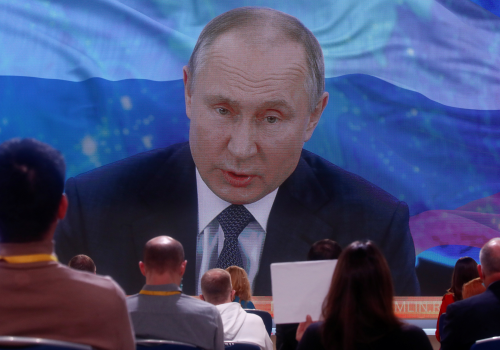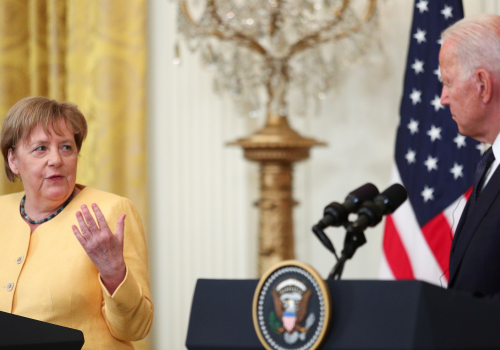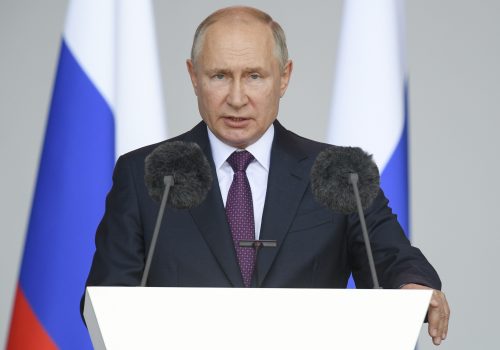What these Russian elections will reveal about the Kremlin’s power
The news ahead of Russia’s parliamentary elections this weekend has little to do with what we commonly associate with elections. There’s very little talk about polls—though credible surveys show that support for President Vladimir Putin’s United Russia party is cratering—and no discussion about kitchen-table issues Russian voters might actually care about.
What dominates the headlines is revealing: a journalist arrested for a social media post supportive of jailed opposition leader Alexei Navalny; Western tech companies pressured to remove content critical of the Kremlin or supportive of its opponents; the federal media regulator blocking a website about the elections sponsored by exiled tycoon and Putin critic Mikhail Khodorkovsky.
At least forty-seven media and civic organizations—including the leading independent Russian election monitor—have been declared “foreign agents,” and for the first time since 1993, the Organization for Security and Cooperation in Europe will not send any election observers for the September 17-19 vote, thanks to what it says are “limitations” by the government.
Meanwhile, repression against opposition leaders and activists has become so intense that many are choosing to flee the country.
If this were a normal election in a democratic country, the Kremlin would be in deep trouble: The ruling United Russia party is polling at an anemic 29 percent nationwide, according to a state-run pollster. But the party is deploying its well-developed toolkit to get the results it wants: that only United Russia, plus a handful of other regime-loyal parties, will win seats in the Duma, the lower house of parliament.
This includes blocking parties and candidates from the ballot, wielding state-controlled media to shape the information environment, and using so-called “administrative resources,” such as busing state employees to the polls to vote for whom they are told.
And if that isn’t enough, officials can always resort to simple ballot-stuffing.
Despite such machinations, however, Russian elections play an important role in the country’s politics. For the Kremlin, they are legitimization rituals as well as tests of its ability to mobilize the population. For the opposition, they are flash points to crystallize dissatisfaction and dissent.
If the Kremlin can secure a respectable turnout and a strong victory for United Russia without resorting to crude falsification, the ritual proves successful. If not, it opens itself up to potential danger—such as in 2011, when a clumsily rigged parliamentary election sparked widespread protests and the rise of Navalny as a national opposition figure.
In those elections Navalny pioneered an early version of a tactic that his supporters are attempting to use today: encouraging critical-minded Russians to vote for any party or candidate other than United Russia. The tactic worked in 2011, and it has since evolved into a method called “smart voting” that’s been successfully used in local and regional elections.
These days, Navalny is in jail, but the movement he launched is carrying forward the mantle—though its quest has been complicated by a Moscow court’s ruling earlier this year effectively banning his political network, the Anti-Corruption Foundation.
The journalist arrested last week, Igor Khoroshilov, was charged with spreading “extremist” symbols following a Facebook post about Navalny’s smart voting strategy. The pressure on Western tech companies amounts to forcing Apple and Google—unsuccessfully, so far—to remove an app run by Navalny’s team that flags candidates in users’ districts who have the best chance of defeating contenders from United Russia. Just this week, Russian media reported that the Apple app store was persistently crashing and only available through a VPN.
Despite the official pressure, Navalny supporters appear determined to develop their smart voting strategy to vault several dozen opposition-minded candidates into parliament.
This week’s election is the last big test for the Kremlin before the 2024 presidential election, in which Putin will likely seek to extend his rule by another two terms until 2036—when he’ll be 83 years old. Given how carefully Russia’s regime is built around the man himself, the question of succession is a notoriously tricky one.
The vote is also taking place in the crossfire of two countervailing trends: United Russia is historically unpopular while the regime has ratcheted up the repression to levels unseen in the post-Soviet era.
There is little doubt that, with enough rigging, the Kremlin can obtain the result it wants and continue its democratic charade. We’ll find out soon whether free-thinking Russians can outsmart it.
Brian Whitmore is a nonresident senior fellow at the Atlantic Council’s Eurasia Center and assistant professor of practice at the University of Texas-Arlington.
Further reading
Image: Russians exercise in front of an election poster in Yakutsk, Russia, on September 7, 2021. Photo by Maxim Shemetov/REUTERS/


